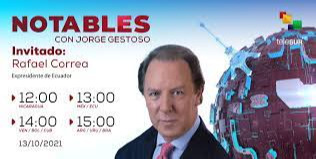
Former Ecuadorian President Rafael Correo interviewed by Jorge Gestoso on "Notables" on teleSUR.
Brussels, October 14 (RHC)-- The former president of Ecuador, Rafael Correa, said it is immoral corruption cases involving the former president, Lenín Moreno and the current one, Guillermo Lasso and demanded his resignation, in an exclusive interview with teleSUR.
Correa's statements came after the National Assembly of Ecuador decided to investigate President Lasso for the tax havens scheme in the so-called Pandora Papers, which the former president said, if it had happened in Europe, the head of state would have resigned or would have, at least, brought forward elections.
However, Correa said in an interview on Jorge Gestoso's program Notables, that after the scandal, Lasso's government will be "in clinical death" and should call for elections.
The former Ecuadorian president was emphatic in criticizing that the rich in Latin America send their money abroad, especially those who claim to be Catholics, particularly someone like Lasso, who belongs to Opus Dei.
Correo said that Lasso lied in his declarations about his companies and that he should never have been a candidate. He is "immoral." However, the former president described Lenin Moreno as a corrupt person who received bribes for opening secret accounts in Belize.
According to Correa, all of Latin America has been bled dry by tax evasion and offshore accounts, and he accused Guillermo Lasso of having benefited from policies he implemented during his time as Minister of Economy.
The former president said that Lasso must explain how he made and unmade his trusts in tax havens and contrasted the policy of tax evasion with what Pope Francis expressed in "Fratelli Tutti," which urges fraternity.
The former president also criticized the setback in terms of sovereignty and integration that has occurred under the governments of Lenín Moreno and Guillermo Lasso and recalled that the Monroe Doctrine continues, because, in essence, the foreign policy of the United States does not change, beyond specific changes of government.

